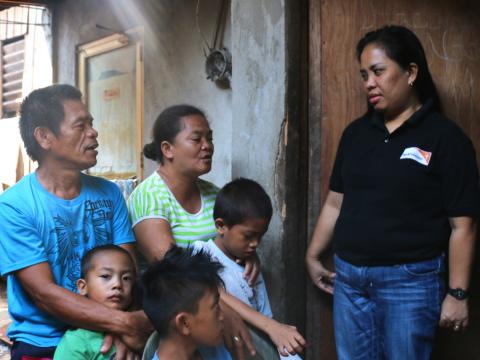Philippines - Fighting the battle against tuberculosis

By Maryann Zamora, World Vision Philippines Communications
Jose, 53, had been exposed to different people from all walks of life. He and his family live in an urban slum area, a congested area where a neighbour’s wall is also their wall. He used to work as a porter in one of the busy bus terminals in Mindanao, in the southern part of the Philippines.
The father of four and sole breadwinner, thought that he had a high resistance to illness thanks to his urban upbringing, but he was wrong.
“I was coughing. I thought it was normal and curable with a cough medicine. My wife gave me medicines but it didn’t make me well,” Jose said. “My wife Lorna convinced me to go to the hospital for a check-up. It was there that I found out that I had TB.”
“I think I got TB at the terminal,” he said of the infectious bacterial disease.
Lorna, 50, said, “My neighbour who is a member of TB Task Force educated me about TB symptoms. I saw those in Jose, so I had him checked.”
The TB Task Force is a group of World Vision volunteers trained to identify people sick with TB and refer them to barangay or village health centres for free diagnostic and treatment services.
The World Vision Tuberculosis Task Force educates the community about TB.
In the Philippines, TB claims lives every day. The Philippine National Tuberculosis Prevalence Survey says there are approximately three cases of tuberculosis out of every 1,000 people. And according to the World Health Organization, the Philippines ranks in the top 10 countries in TB prevalence.
“Most people with TB die because they do not seek the treatment they need. They were afraid to be confronted by stigma in the community,” says Lucia Magsayo, who worked with the World Vision Social Mobilization on Tuberculosis project.
The World Health Organization, ranks the Philippines in the top 10 countries in TB prevalence.
World Vision’s Social Mobilization on Tuberculosis project is helping communities in the Philippines respond through a network of local volunteers dedicated to supporting those affected by the disease through engaging communities in TB care and management.
Jose admitted that he was in denial and refused to begin treatment at first. He feared being shunned by his neighbours because of his illness.
“Aside from being worried about the stigma, I had neighbours who had died because of TB. I was afraid to die because my children were still young,” Jose said.
“We were advised to go to the health centre for the treatment. I had to take six months of medication,” he says. “The process was really hard for the entire family. I isolated myself from my children and grandchildren for some time because I did not want them to be infected.”
Aside from several weeks of isolation, Jose could barely walk as a side effect of the medication. Despite the difficulties, Jose made it through the long treatment process.
“We were blessed by people who helped us monitor the medication,” he says.
Jose had a treatment partner who belonged to the TB Task Force.
"I don’t think I would be alive today if I didn’t get the free medication."
“The Task Force member checks if the patient is taking their medication. The medication is vital and should be maintained [for the entire course] to prevent a relapse,” Magsayo says.
The government and World Vision helped Jose with the cost of medication. “When I was still a porter, I was earning less than 300 pesos (about USD 7) a day. I don’t think I would be alive today if I didn’t get the free medication,” he says.
Now, whenever the family notices people with TB symptoms they encourage them to go to a health centre for a check-up.
“I advise my neighbours that TB is curable when detected and treated,” Jose says.